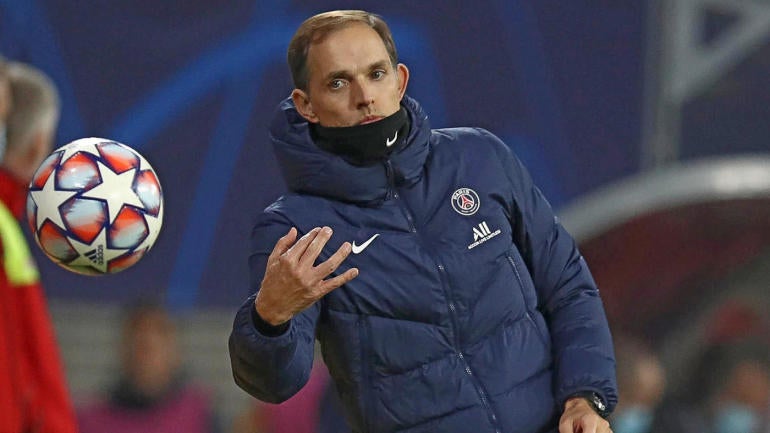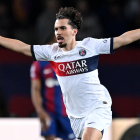
Thomas Tuchel is Chelsea's next manager. It's easy to see why Chelsea tapped him as Frank Lampard's replacement. Tuchel has experience managing at the highest levels, recently having parted ways with Paris Saint-Germain, and having helmed Borussia Dortmund before that. There simply aren't many managers who are both experienced and available in the middle of the season, Tuchel fits that bill. He's also German, which is appealing given that two of Chelsea's biggest summer purchases, Timo Werner and Kai Havertz, are both German, and both are currently struggling to find form with Chelsea. And then, there's Tuchel's tactical style.
Playing pretty soccer has always been an aspiration for Chelsea. It's an aspiration that fits somewhat awkwardly alongside their best spells of success which have come under more utilitarian managers in Jose Mourinho and Antonio Conte. Even their unlikely Champions League run in 2012 under Robert Di Matteo was the result of an interim manager coming and setting a team up to defend and counterattack against favored opposition. In the final that year, they were out-passed, completing only 418 passes to Bayern Munich's 544, and out-shot an incredible 43 to 9, but all that mattered in the end was that they won on penalties.
Fabrizio Romano has the latest on Chelsea's managerial move and much more in the world of soccer. Listen below and subscribe to ¡Qué Golazo! A Daily CBS Soccer Podcast where we take you beyond the pitch for complete coverage of transfers, previews, recaps and more.
Tuchel certainly wants to play pretty soccer. His teams are obsessed with passing the ball. Over his season and a half at PSG, his teams had 64.6% possession in league play. That's not just a lot, it's an almost impossible amount. Over that time period nobody else was even close. Lyon had the second-most at 55.6%. Of course, PSG are a unique situation: They have a budget that dwarfs the rest of the league and talent to match. But even during his two seasons at Dortmund, his team averaged 62.6% of the ball. The man really wants his team to kick the ball around.
Despite all that possession, however, his sides do not pile on the shots. If we again go back to look at his Dortmund teams, where he had the benefit of a very talented side, the second-best side in the Bundesliga, but not the embarrassment of riches he had at his disposal at PSG, we see a team that took less shots than behemoths Bayern Munich, 15.60 vs. 18.37 per game but actually averaged a higher expected goal total, 2.29 to 2.22.
This trend of building a team that focuses on generating high value xG shots extends back even further in Tuchel's managerial career. During his time at Mainz, when he managed the club from the 2009-10 season through the 2013-14 season, Tuchel took a club with comparatively few resources and turned them into a side that could generate a respectable attack while not taking very many shots. Over those years 24 teams played in the Bundesliga and Mainz ranked 18th in shots taken per match with 11.81. Only one team, Freiburg, managed to survive in the Bundesliga for the entirety of those five seasons while taking fewer shots than Mainz. But, over those seasons, Tuchel's teams averaged a respectable 1.23 xG per 90, the 11th out of those 24 teams.
At every stop in his career, Tuchel has built teams that look to hold the ball and move it around the field in order to create high quality shots. He will almost certainly take the same approach at Chelsea. How he will approach Chelsea's squad in order to create those chances is a little less clear. Chelsea have an expensively assembled roster with parts that don't quite fit together, and it will be up to Tuchel, who has never been married to a specific formation, to figure out how to make the parts work. It was a failure to do that that ultimately cost Lampard his job.
Tuchel has approached that task in varying ways over the years. At PSG, he crammed as many superstars onto the pitch as he could manage. That's the job when you're handed Neymar, Kylian Mbappe, Edinson Cavani, Angel Di Maria and a never-ending list of other stars. At Dortmund, Tuchel was perfectly happy to play his stars, players like Pierre-Emerick Aubameyang, Marco Reus and Henrikh Mkhitaryan, but he also gave major minutes to teenagers like Ousmane Dembele, Julian Weigl and Chelsea's very own Christian Pulisic. All of which is to say that as Tuchel inherits a roster which is a mix of both expensive stars and young talent (or in Pulisic and Havertz's cases in particular, both), expect him to happily mix and match to find lineups that work, rather than relying solely on either youth or experience.
One area where Tuchel may surprise Chelsea supporters is how he handles midfielders. It would be natural to expect a manager that prizes possession to want to feature a player at the base of his midfield who is a passing dynamo, somebody who is always on the ball and quick to exchange hundreds of short quick passes with his teammates as he conducts the match up and down the pitch, somebody like, say, Chelsea's Jorginho. But, that actually hasn't been Tuchel's preferred approach. At PSG, despite having an infinite number of slick passing midfielders at his disposal, Tuchel opted to deploy Marquinhos, who had been playing at center-back prior to his arrival, into the team's defensive midfielder. Similarly, at Dortmund, he turned Julian Weigl, a traditional defensive midfielder, into a star. And once Tuchel left, Weigl's star quickly faded.
Tuchel believes strongly in pushing both of his fullbacks up the field, something that should bode well for Chelsea's Ben Chilwell and Reece James, but in order to do that he prefers his defensive midfielder to be able to drop into the defensive line and form a back three with the team's two central defenders. While it's important whoever that player is has the passing range to move the ball up the field, the role is not one that requires whoever occupies the position to be on the ball all the time. It's not clear that Chelsea currently have a player well fitted to that role, and how Tuchel solves that particular problem will likely impact how he lines the rest of the side up.

Ultimately, the principles that drive Tuchel's management are clear. He wants to keep the ball and use it to create great shots. How he will line the team up in order to do that, however, is an open question. With too many attackers to squeeze on the field, and without the kind of defensive-minded passer he prefers to play at the base of the midfield, Tuchel will have to adjust on the fly, and make the best of an awkward, but talented roster. How he solves those problems will determine whether he succeeds. Frank Lampard ultimately failed at the task of molding these players into a cohesive side. Tuchel's vision of what a team should look like might differ from Lampard's, but the task remains the same. Make the pieces work. Do it and he'll be a Chelsea legend. Fail and he'll likely be out the door just as fast as his Chelsea legend predecessor.





















